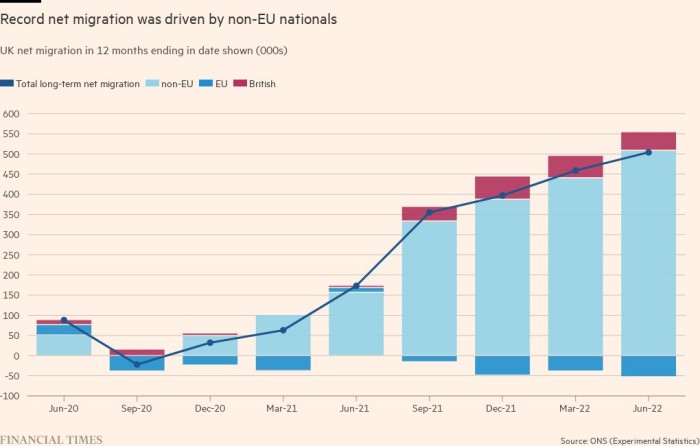Net migration to the UK rose to a record high of more than half a million people in the year to June 2022, according to figures published by the Office for National Statistics on Thursday.
The surge in long-term arrivals to the UK was driven by a post-pandemic rebound in international study and by inflows of Ukrainian and Afghan refugees and Hong Kong residents. Overseas recruitment by UK employers — the NHS in particular — also contributed.
“Brexit has not reduced net migration . . . The end of free movement doesn’t mean the UK is closed to migrants; just open in a different way,” said Jonathan Portes, professor of economics and public policy at King’s College, London. But he added that future flows were unlikely to remain at current levels, and it was too soon to say whether overall work-related migration would increase.
The data indicated that immigration reached 1.1mn in the 12 months to June, with emigration of 560,000, leading to net immigration of 504,000. This is roughly three times the net immigration total in the previous year, when the pandemic weighed on international travel, and double the historic average.

The increase is at odds with the government’s stated goal of reducing net immigration, which Prime Minister Rishi Sunak confirmed earlier this week, rebuffing calls from business leaders to ease visa rules.
Downing Street said on Thursday that Sunak remained “fully committed to bringing overall numbers down”, adding “there are some unprecedented and unique circumstances which are having a significant impact on these statistics”. Number 10 added that the prime minister had “not put a specific timeframe” on reducing immigration.
Jay Lindop, director of the ONS’s Centre for International Migration, said an “unprecedented” series of world events, including the end of coronavirus lockdowns, the post-Brexit transition, the war in Ukraine and the resettlement of Afghans and Hong Kong British nationals, had all contributed to “record levels of long-term immigration”. This meant it was too early to say whether higher inward migration would continue, she added.
The ONS said Thursday’s estimates were provisional and experimental because they were based on new methodology, drawing on administrative data collected by different government departments. However, the figures offer the most complete indication to date of how the post-Brexit changes in UK migration policy are affecting the population.
Greg Thwaites, research director at the Resolution Foundation, said the data suggested migration patterns had “fundamentally shifted post-Brexit”, with 51,000 more EU citizens leaving the UK than arriving in the year to June.
The ONS said of the 1.1mn people who came to stay in Britain long-term, 704,000 were from outside the EU — an increase of 379,000 from the previous year. The net migration figure of 504,000 compares with official estimates that net migration would eventually settle at just above 200,000 a year.
If migration continues at higher levels, boosting the size of the UK’s workforce, it would have implications for the economy and public finances. The Office for Budget Responsibility said last week that an upgrade to its forecast for net migration was the only factor adding “materially” to the UK’s potential growth prospects over the coming five years.
However, both the Home Office and independent experts said the latest figures were not a reliable guide to future trends, with immigration likely to slow, and emigration rise, over the next few years.
Madeleine Sumption, director of Oxford University’s Migration Observatory, said unusually high levels of immigration had been driven by humanitarian routes, the rebound in international study and high demand for staff in the NHS, with policy decisions taken as a result of Brexit playing a smaller role.
“We cannot assume they represent a ‘new normal’, and it would be rash to take major policy decisions based only on these numbers,” she said.
The ONS also revised down its migration estimates for the previous two years. It now puts net migration for the year to June 2020 at 88,000, a total that grew to 173,000 for the year to June 2021.
The ONS said the fastest growth in visa issuance during the past year was for students. Many of these will leave the UK at the end of their courses, although a recent relaxation in visa rules could allow more to stay and work when they graduate than in previous years.
Schemes for Ukrainians, Afghans and Hong Kong residents accounted for 140,000 of the net migration total. But the figures do not include people who arrived through clandestine routes.
Quarterly statistics on visa issuance published separately by the Home Office on Thursday confirmed the overall picture painted by the ONS data. It also showed that 44,500 people arrived by small boats across the Channel in the year to September 2022, almost half of them in the three months to September.
The Home Office figures showed 72,000 asylum claims were submitted in the year to September, an increase of 88 per cent from the previous year. However, the number of initial decisions on asylum claims rose by just 11 per cent — leading a backlog of unprocessed claims to lengthen to 143,000.
Additional reporting by Sebastian Payne
Stay connected with us on social media platform for instant update click here to join our Twitter, & Facebook
We are now on Telegram. Click here to join our channel (@TechiUpdate) and stay updated with the latest Technology headlines.
For all the latest Business News Click Here
For the latest news and updates, follow us on Google News.
